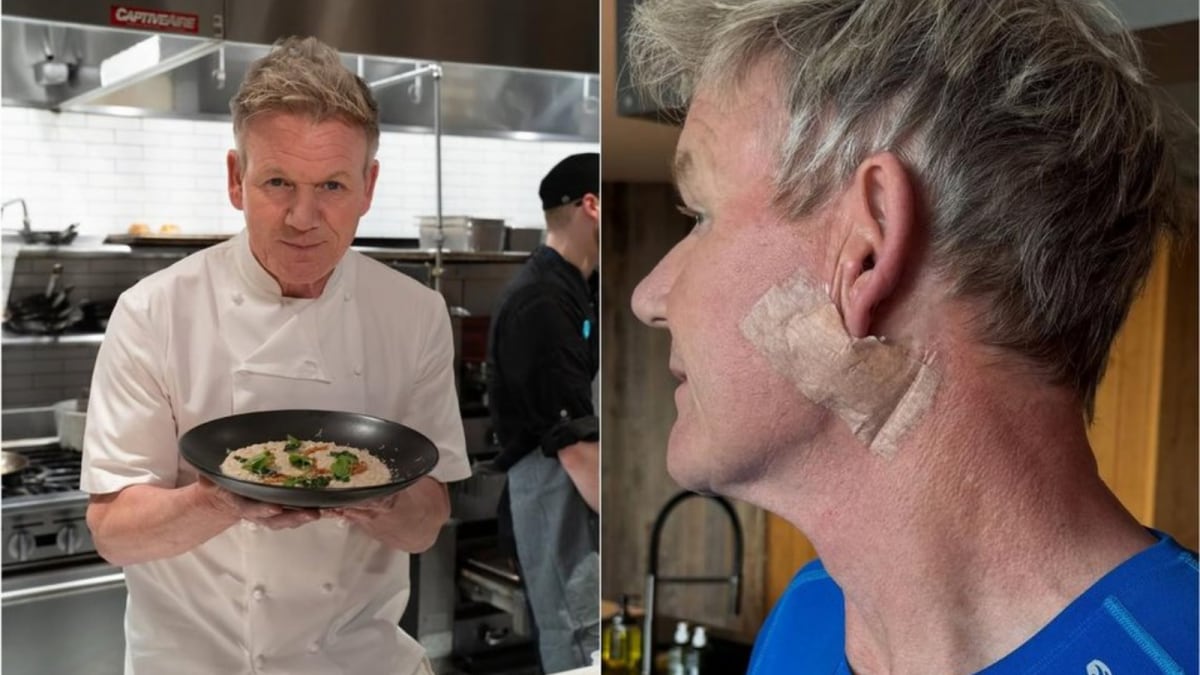Last Updated:
Gordon Ramsay’s skin cancer surgery is a wake-up call on sun safety, reminding even Indians with melanin-rich skin to use sunscreen and stay vigilant.

Gordon Ramsay reveals skin cancer surgery, urges sunscreen protection
Celebrity chef Gordon Ramsay, 58, has revealed that he underwent surgery to remove basal cell carcinoma (BCC), a common form of skin cancer. Sharing a photo of his scars on Instagram, Ramsay reminded fans of the importance of daily sunscreen use to shield the skin from harmful UV rays.
His disclosure comes shortly after former Australian cricket captain Michael Clarke, who lifted the 2015 World Cup revealed that he had his sixth surgery to treat skin cancer on his nose. Both their stories carry an urgent health reminder: skin cancer is real, prevention is better than cure, and early detection saves lives.
Recommended Stories
What is basal cell carcinoma (BCC)?
BCC is the most common type of skin cancer, originating in the epidermis, or the skin’s outermost layer. “It usually presents as a pink bump or discoloured patch on sun-exposed areas such as the face, scalp, or neck. Detected early, it is highly treatable and rarely spreads,” explains Dr. Rakesh Agrawal, senior consultant and head of radiation oncology, Andromeda Cancer Hospital, Delhi. He advises monitoring new moles or skin lesions that change in appearance.
While BCC is far less common among Indians due to higher melanin levels, cases are rising. “Melanin does provide protection, but skin cancer is not rare. The Indian Cancer Registry shows increasing incidence, especially in the northeastern states. Early detection is crucial,” Dr. Agrawal adds.
How does melanin protect the skin?
Melanin works like a natural sunscreen, absorbing harmful UV radiation and shielding DNA from damage. Darker skin tones absorb more UV rays than lighter skin, but the risk of skin cancer is never eliminated.
Do Indians really need sunscreen?
“Yes, absolutely,” stresses Dr. Agrawal. He recommends using sunscreen with SPF 30 or higher daily. “SPF, or sun protection factor, measures how much radiation is blocked. SPF 30 can filter up to 97% of UVB rays, which are the primary cause of skin cancer.” Along with sunscreen, he advises protective clothing and limiting sun exposure between 10 am and 4 pm.
Do skin-lightening creams increase cancer risk?
Prolonged use of products containing hydroquinone, mercury, or steroids can reduce melanin and strip away the skin’s natural defence against UV rays, significantly raising the risk of cancer. “Hydroquinone damages skin cells, making them prone to sunburn and premature ageing. Mercury compounds weaken the skin barrier, leaving it vulnerable,” explains Dr. Chandani Jain Gupta, dermatologist at Elantis Healthcare, Delhi.
She also cautions that chemical peels and laser treatments, while popular, thin the skin’s protective layers and increase photosensitivity. In India, many over-the-counter lightening creams are unregulated and contain dangerous concentrations of these ingredients.
The takeaway
Indians may have the natural protection of melanin, but it is not a shield against skin cancer. Consistent sun protection, awareness of skin changes, and safe skincare choices remain the best defence.
About the Author

Swati Chaturvedi, a seasoned media and journalism aficionado with over 10 years of expertise, is not just a storyteller; she’s a weaver of wit and wisdom in the digital landscape. As a key figure in News18 Engl…Read More
Swati Chaturvedi, a seasoned media and journalism aficionado with over 10 years of expertise, is not just a storyteller; she’s a weaver of wit and wisdom in the digital landscape. As a key figure in News18 Engl… Read More
Loading comments…
Go to Source
Author: News18




